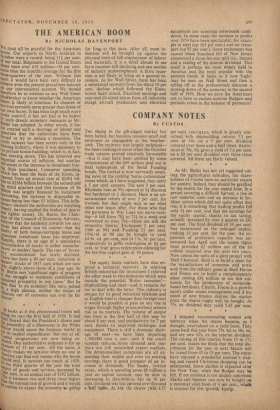COMPANY NOTES
By CUSTOS THE slump in the gilt-edged market has been halted, but business remains small and sentiment as changeable as the weather- cock. The recovery was largely technical— the bears rushing to cover when the October trade returns proved relatively favourable —but it may have been assisted by some reinvestment of the £99 million paid out in final redemption of the Serial Funding bonds. The market is now nervously await- ing news of the coming 'home corporation' issues which, as I have suggested, may carry a 5 per cent. coupon. The new 5 per cent. Rhodesia loan at 991 opened at 11 discount but hardened to 4 discount. Here is an un- accustomed return of over 5 per cent. for trustees, but they might wait to see what other new issues offer. For those who find the gyrations in War Loan too nerve-rack- ing—it fell from 781 to 731 in a week and recovered to over 764—there are still the attractive 'shorts.' Exchequer 2 per cent. 1960 at 901 and Funding 21 per cent. 1956/61 at 90 can be bought to yield £4 9s. 6d. per cent and £4 13s. 3d. per cent. respectively to gras redemption or 61 per cent. to 'true' gross redemption allowing for the tax-free capital gain of 10 points.
The equity share markets have also en- joyed a technical recovery. In selecting British industrials for investment I referred the other week to two industries which were outside the potential 'Butler recession'— shipbuilding and steel—and it remains for me to deal with the latter. This industry is unique for its good industrial relations and as English steel is cheaper than foreign steel it would be possible to pass on any rise in wages through higher prices .without serious risk to its markets. The volume of output has risen in the first half of this year by about 8 per cent, and productivity by 7 per cent. thanks to improved technique and equipment. There is still a domestic short- age of steel—we have been importing 1,300,000 tons a year—and if the credit squeeze reduces. home demand next year there are still unsatisfied export markets. The denationalised companies are all ex- panding their output and even on existing earnings there is good prospect of an in- crease in dividends. The leader, UNITED STEEL, which is spending some £8 million'a year on capital account, may be slow in increasing its distribUtion, but its 10 per cent. dividend was last covered over five and a .half tiatils. At. 44s. the shares yield 4.55 per cent. COLVILLES, which is greatly con- cerned with shipbuilding, returns 5.3 per cent. at 34s. on a 9 per cent, dividend covered over three and a half times. WHITE- HEAD at 70s. 9d. gives a yield of 5.6 per cent. on a 20 per cent dividend over three times covered. All these are fairly valued.
As Mr. Butler has not yet suggested cut- ting the agricultural subsidies, the share- holders of FISONS have no particular reason for anxiety. Indeed, they should be gratified by the results for the year ended June. In a period covering a difficult harvest, a rise in raw material costs and an increase in fer- tiliser prices which did not quite offset that rise, it is something that trading profits fell only 31 per cent, and that net earnings for the equity capital, thanks to tax saving, actually increased by over a quarter to 281 per cent. The final dividend of 10 per cent. was maintained on the enlarged capital, making 15 per cent. for the year. An ex- pansion of productive capacity was an- nounced last April and the recent rights issue provided £2 million out of the £6 million required over the next two years. Now comes the news of a joint project with Shell Chemical. Shell is to build a plant for the 'manufacture of ammonia and nitric acid from the refinery gases at Shell Haven and Fisons are to build a complementary plant costing £41 million to use this am- monia for the production of ammonia- based fertilisers. Clearly, Fisons is a growth equity under sound management and if the needs of new finance depress the market price the shares might well be bought. At 55s. ex dividend they yield 5.45 per cent.
I stopped recommending MARKS AND SPENCER when the shares became, as I thought, overvalued on a yield basis. They came back this year from 75s. 9d. to 58s. 6d. and are now 67s. ex the interim dividend. The raising of this interim from 15 to 171 per cent, makes me think that the total dis- tribution for the year to next March will be raised from 45 to 55 per cent. The stores have enjoyed a wonderful summer's trad- ing and record Christmas shopping can be anticipated. Some decline is expected after the New Year, when the Budget may be felt. If my estimate is not unduly optimistic Marks and Spencer can now be bought on a potential yield basis of 4 per cent., whidt is unusual for this 'growth' equity.










































































 Previous page
Previous page